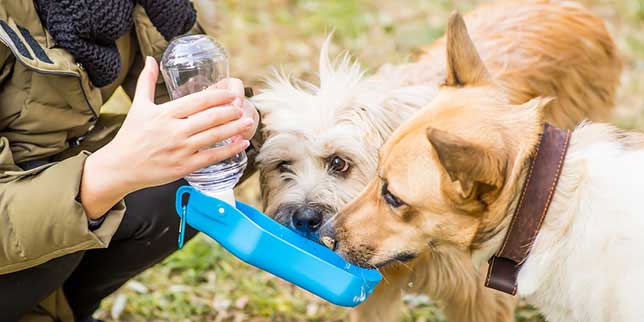Adding a Second Dog to Your Family: Pros and Cons

The more dogs, the merrier, right? Sometimes.
Each pet family is different, so it’s awesome you’re thinking through the decision of adding a second dog.
Dr. Melanie has always had two dogs, and she sees A LOT of multiple-dog families.
We asked her to share potential benefits — and
cons — of getting a second dog.
Plus, scroll down for her thoughts on good ages and genders for a second dog, so you can choose well for your family.
Benefits of getting a second dog
- You can double the fun and silly anticsin your home.
- Some dogs LIKE having a companion. If you have a nervous dog who suffers from separation anxiety, for example, a second dog in your home may help lower your first dog’s anxiety.
- Younger dogs can become playmates with each other.
- If your first dog is destructive from boredom, you may be able to redirect your dog’s energy, so the dogs entertain each other instead.
- If you have kids, a second dog can make another good playmate.
- One person can usually still walk two dogs. (Think about the size and strength you can handle.)
- If your dogs are a few years apart, you’ll still have a furry friend when the other passes away.
Cons of getting a second dog
- Two dogs take more time, even if they’re entertaining each other. Make sure you have enough time for one dog before considering a second dog.
- Two dogs are a greater expense. Depending on the
size and age of your dogs, you may be doubling your food, boarding, grooming, and veterinary care bills. - Some dogs like to be the only dog. Not every dog wants a buddy. You may change the dynamic with your first dog.
- If you travel a lot or know you’re going to deployit can be easier (and less expensive) to find care for one dog rather than two.
- If someone in your home has allergies, you’ll need to look for an allergy-resistant dog.
Alpha personality and gender considerations when adding a second dog
Dogs consider you their pack.
There are some dogs that have more of an alpha personality than others. (It could be either a female dog or a male dog.)
Mixing the genders can help if you have a dog with a strong alpha personality.
In this case, look for a second dog that is the opposite sex and is more laid back and mellow.
Avoid getting two strong alpha personalities, and always have a neutral place, so you can see how they interact.
(If one dog is physically aggressive to the other, this is not good.)

Can dogs of the same gender get along together? Absolutely.
Our veterinarians have had personal experience mixing two male dogs and two female dogs together. The dogs have done fine.
The key is to be in tune with each dog’s alpha tendencies.
Age considerations when getting a second dog
Generally speaking, there isn’t a “best age” to get a new dog, but there are a few age considerations:
- Avoid introducing a puppy if you have a geriatric
dog. (Your dog is 10+ years.) It can be really taxing on your senior dog. - If you get a younger dog when your dog is 6-8 years old, this may help keep your older dog acting more youthful.
- If you’re getting two puppies from the same litter, make sure you spend time separately with each dog, so the dogs bond with you (and not just with each other). Otherwise, you may be treated as an outsider.
On that note, ANY TIME you’re getting a second dog, it’s always a good the idea is to make sure you’re spending quality time with each dog separately, so they bond with you.
